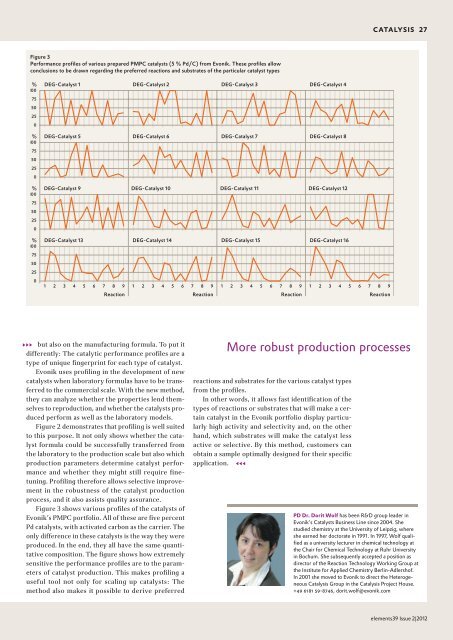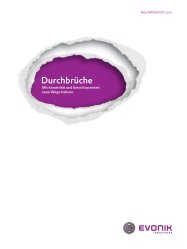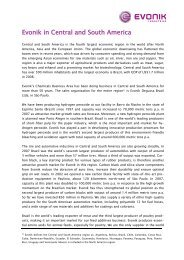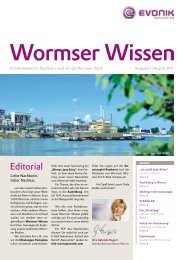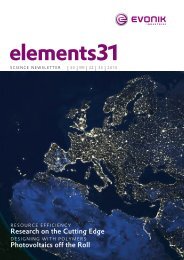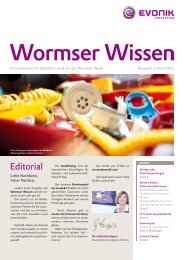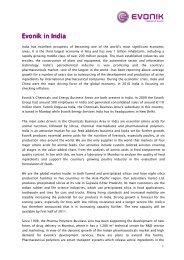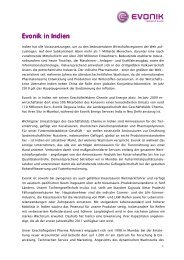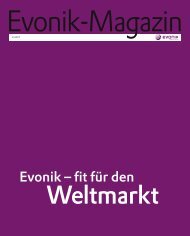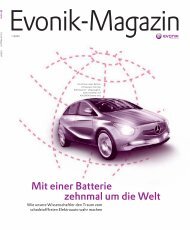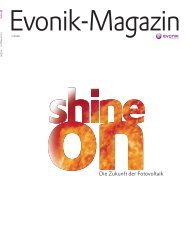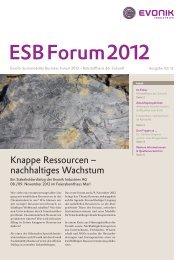Download - Evonik Industries
Download - Evonik Industries
Download - Evonik Industries
Create successful ePaper yourself
Turn your PDF publications into a flip-book with our unique Google optimized e-Paper software.
Figure 3<br />
Performance profiles of various prepared PMPC catalysts (5 % Pd/C) from evonik. these profiles allow<br />
conclusions to be drawn regarding the preferred reactions and substrates of the particular catalyst types<br />
%<br />
100<br />
75<br />
50<br />
25<br />
0<br />
%<br />
100<br />
75<br />
50<br />
25<br />
0<br />
%<br />
100<br />
75<br />
50<br />
25<br />
0<br />
%<br />
100<br />
75<br />
50<br />
25<br />
0<br />
DEG-Catalyst 1 DEG-Catalyst 2 DEG-Catalyst 3 DEG-Catalyst 4<br />
DEG-Catalyst 5 DEG-Catalyst 6 DEG-Catalyst 7 DEG-Catalyst 8<br />
DEG-Catalyst 9 DEG-Catalyst 10 DEG-Catalyst 11 DEG-Catalyst 12<br />
DEG-Catalyst 13 DEG-Catalyst 14 DEG-Catalyst 15<br />
DEG-Catalyst 16<br />
1 2 3 4 5 6 7 8 9 1 2 3 4 5 6 7 8 9 1 2 3 4 5 6 7 8 9 1 2 3 4 5 6 7 8 9<br />
Reaction Reaction Reaction Reaction<br />
333 but also on the manufacturing formula. To put it<br />
differently: The catalytic performance profiles are a<br />
type of unique fingerprint for each type of catalyst.<br />
<strong>Evonik</strong> uses profiling in the development of new<br />
catalysts when laboratory formulas have to be transferred<br />
to the commercial scale. With the new method,<br />
they can analyze whether the properties lend themselves<br />
to reproduction, and whether the catalysts produced<br />
perform as well as the laboratory models.<br />
Figure 2 demonstrates that profiling is well suited<br />
to this purpose. It not only shows whether the catalyst<br />
formula could be successfully transferred from<br />
the laboratory to the production scale but also which<br />
production parameters determine catalyst performance<br />
and whether they might still require finetuning.<br />
Profiling therefore allows selective improvement<br />
in the robustness of the catalyst production<br />
process, and it also assists quality assurance.<br />
Figure 3 shows various profiles of the catalysts of<br />
<strong>Evonik</strong>’s PMPC portfolio. All of these are five percent<br />
Pd catalysts, with activated carbon as the carrier. The<br />
only difference in these catalysts is the way they were<br />
produced. In the end, they all have the same quantitative<br />
composition. The figure shows how extremely<br />
sensitive the performance profiles are to the parameters<br />
of catalyst production. This makes profiling a<br />
useful tool not only for scaling up catalysts: The<br />
method also makes it possible to derive preferred<br />
reactions and substrates for the various catalyst types<br />
from the profiles.<br />
In other words, it allows fast identification of the<br />
types of reactions or substrates that will make a certain<br />
catalyst in the <strong>Evonik</strong> portfolio display particularly<br />
high activity and selectivity and, on the other<br />
hand, which substrates will make the catalyst less<br />
active or selective. By this method, customers can<br />
obtain a sample optimally designed for their specific<br />
application. 777<br />
CAtALYsIs<br />
More robust production processes<br />
Pd dr. dorit Wolf has been R&D group leader in<br />
<strong>Evonik</strong>’s Catalysts Business Line since 2004. She<br />
studied chemistry at the University of Leipzig, where<br />
she earned her doctorate in 1991. In 1997, Wolf qualified<br />
as a university lecturer in chemical technology at<br />
the Chair for Chemical Technology at Ruhr University<br />
in Bochum. She subsequently accepted a position as<br />
director of the Reaction Technology Working Group at<br />
the Institute for Applied Chemistry Berlin-Adlershof.<br />
In 2001 she moved to <strong>Evonik</strong> to direct the Hetero geneous<br />
Catalysis Group in the Catalysis Project House.<br />
+49 6181 59-8746, dorit.wolf@evonik.com<br />
27<br />
elements39 Issue 2|2012


